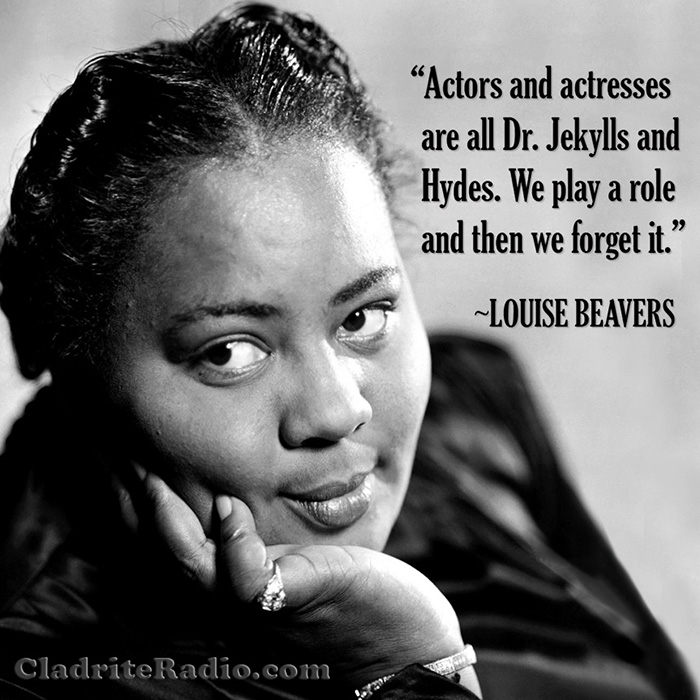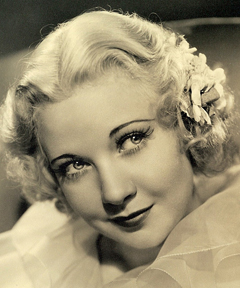Here are 10 things you should know about Una Merkel, born 119 years ago today. She’s our favorite second-banana starlet of the 1930s.
Tag: Bombshell
Happy 115th Birthday, Louise Beavers!
The delightful Louise Beavers was born 115 years ago today in Cincinnati, Ohio. Beavers made the very most of the extremely limited opportunities Hollywood offered African American performers in her time, but we can’t help but mourn for what might have been, for Beavers and for so many other black actresses and actors. Here are 10 LB Did-You-Knows:
- Beavers’ father, a school teacher, moved the family to Pasadena, California, when Louise was 11 years ago. While Beavers attended Pasadena High School, her mother, a voice teacher, trained her daughter for the concert stage, but Beavers instead joined an all-female minstrel company called “Lady Minstrels” and spent time in vaudeville. She also worked as a dressing room attendant for a photographer, a nurse, and as a personal maid to silent film star Leatrice Joy.
- A Central Casting Bureau talent scout named Charles Butler saw Beavers perform and urged her to try for a movie role. Beavers was hesitant due to the typically derogatory portrayal of African Americans in pictures at the time, but she was finally persuaded and won a role in Uncle Tom’s Cabin (1927).
- Though Beavers broke into movies near the end of the silent era, she smoothly made the transition into talkies, making more than 75 film appearances by 1935—she appeared in twenty pictures in 1933 alone! Though Beavers’ roles were (sadly) limited to the sort of maid, mammy and slave characters that black actresses were restricted to in those days, she brought a sense of wisdom, warmth and gentleness to them that allowed her to rise above their inherently cardboard, stereotypical nature.
- In 1934, Beavers was given a breakout role in Imitation of Life opposite Claudette Colbert. In that film, she plays Delilah Johnson, a single mother who agrees to serve as a housekeeper for a white widow named Bea Pullman (Colbert) in exchange for room and board for her and her daughter. Delilah and Bea team to open a pancake recipe (using Delilah’s secret recipe) and together become very wealthy, though their respective relationships with their daughters become strained. Beavers was billed fourth for the film, but anyone who’s seen the picture knows that she deserved equal billing with Ms. Colbert, not only for the size and importance of her role but for the memorable and moving performance she delivered.
- After that moment in the spotlight, though, Beavers returned to playing the secondary characters she’d always played, bringing humanity to them but leaving us 21st century movie buffs bemoaning what might have been if had Beavers been allowed to build on her wonderful work in Imitation of Life.
- Beavers was just a year older than Fredi Washington, who played her daughter in Imitation of Life.
- Like other black performers of the day, Beavers sometimes came in for criticism from the African-American community for accepting the kind of derogatory roles Hollywood offered. She defended herself and performers like her, saying, “I am only playing the parts. I don’t live them,” but as she became more successful and better known, she began to speak out more about Hollywood’s poor treatment of black performers.
- Even after finding success in movies, Beavers continued to work in live theatre, taking part in annual tours of twenty weeks’ duration.
- Beavers was the third of three actresses to portray Beulah Brown on the comedic television program The Beulah Show, which began as a radio show before moving to TV. Ethel Waters originated the role on television, followed by Hattie McDaniel, whose health forced her to drop out after just six episodes, at which point Beavers came in as her replacement. The show came in for criticism for its stereotypical characters, but it was the first sitcom to star an African-American performer.
- Among the more than 150 features and shorts in which Beavers appeared are Our Blushing Brides (1930), What Price Hollywood? (1932), 42nd Street (1933), The Story of Temple Drake (1933), Bombshell (1933), Make Way for Tomorrow (1937), Made for Each Other (1939), Mr. Blandings Builds His Dream House (1948) and The Jackie Robinson Story (1950).
Happy birthday, Louise Beavers, wherever you may be!

Happy 112th Birthday, Una Merkel!
In Herman Raucher‘s coming-of-age novel Summer of ’42, his teenaged protagonist (perhaps not coincidentally named … Hermie) has a big crush not on Lana Turner, Betty Grable, or Rita Hayworth, but on Penny Singleton, best known for portraying Blondie, wife to Arthur Lake‘s Dagwood in a long series of comic B-pictures.
Hermie was a little bit embarrassed by his preference in movie stars, but he figured there was not as much competition that way.
We have a similar little thing for Una Merkel, whose 112th birthday it is today. Una came to specialize in playing wise (and sometimes wisecracking), loyal second bananas to the leading ladies in films of the Pre-Code Era, but she was certainly not without her own charms, not the least of which was her Southern drawl.
Ironically enough, it was Una who was first slated to play Blondie in that popular series of films before the role was finally awarded to Singleton.
Merkel was born Una Kohnfelder in Covington, Kentucky (we’ve long wondered at the choice of Merkel to replace Kohnfelder. It doesn’t seem the typical choice for a studio-concocted screen name) and began her career in silent movies. She’s listed in some sources as having appear in a 1924 short called Love’s Old Sweet Song and a feature film produced in Texas that same year called The Fifth Horseman. This now-lost (and good riddance) picture was an entry in the then-active genre of pro-Ku Klux Klan films, so perhaps the less said about it, the better. (We hope and trust our Una was just in it for the money.)
Merkel is said to have resembled Lillian Gish during the early years of her career, and she served as her stand-in for a while (on the 1928 classic The Wind, among others). After some time on Broadway, she was back before the cameras, portraying Anne Rutledge in D. W. Griffith‘s 1930 biopic, Abraham Lincoln.
As the years passed, Merkel got to stretch out a bit and her career showed staying power (her final role final role was in 1968, on the popular television program I Spy). Along the way, she appeared in Jean Harlow‘s final picture, Saratoga (1937), indulged in a hair-pulling catfight with Marlene Dietrich in Destry Rides Again (1939), and even appeared in the 1961 Disney comedy The Parent Trap as the Evers’ family’s housekeeper.
But our crush stems from her work in the 1930s, when she was every glamour gal’s best pal in movies such as Red-Headed Woman, 42nd Street, and Bombshell.
Here’s a scene from the latter picture, featuring our Una opposite Harlow and Louise Beavers.
This is a revised version of a post that was originally published on Dec 10, 2013.
Happy Birthday, Una Merkel!
 In Herman Raucher‘s coming-of-age novel Summer of ’42, his protagonist (coincidentally named … Hermie) has a big crush not on Lana Turner, Betty Grable, or Rita Hayworth, but on Penny Singleton, best known for portraying Blondie, wife to Arthur Lake‘s Dagwood in a long series of comedy B-pictures.
In Herman Raucher‘s coming-of-age novel Summer of ’42, his protagonist (coincidentally named … Hermie) has a big crush not on Lana Turner, Betty Grable, or Rita Hayworth, but on Penny Singleton, best known for portraying Blondie, wife to Arthur Lake‘s Dagwood in a long series of comedy B-pictures.
Hermie was a little bit embarrassed by his preference in movie stars, but he figured there was not as much competition that way.
We have a similar little thing for Una Merkel, whose 110th birthday it is today. Una came to specialize in playing wise and loyal second bananas to the leading ladies in romantic comedies, but she was certainly not without her own charms, not the least of which was her Southern drawl (she was born and raised in Kentucky).
Ironically enough, it was Una who was first slated to play Blondie before the role was finally awarded to Singleton.
Una enjoyed a lengthy career that began on Broadway before she started working in pictures in the late silent era. Her final role was in 1968, opposite Bill Cosby and Robert Culp on the popular television program I Spy.
But our crush stems from her work in the 1930s, when she was the glamour girl’s best pal in movies such as Red-Headed Woman, 42nd Street, and Bombshell.
Here’s a scene from the latter picture, featuring our Una opposite Jean Harlow and Louise Beavers.
Hail to the Victor!
 New York’s Film Forum is presenting a two-week Victor Fleming retrospective that kicks off with a don’t-miss double bill on Friday and Saturday:
New York’s Film Forum is presenting a two-week Victor Fleming retrospective that kicks off with a don’t-miss double bill on Friday and Saturday:
RED DUST
(1932) Raunchily hilarious passion in the jungle, as Saigon hooker Jean Harlow battles prim socialite Mary Astor for multi-woman rubber planter Clark Gable.“Harlow [delivers] her zingy wisecracks with a wonderful dirty humor. Directed by Fleming in a racy, action-packed style.” — Pauline Kael
BOMBSHELL
(1933) Jean Harlow’s Lola Burns — the “IF Girl” — supports sponging family, endless entourage and a major Hollywood studio, while fending off romantic con artist Franchot Tone and stop-at-nothing press agent Lee Tracy.“One of the fastest and funniest Hollywood pictures ever made.” — Photoplay
BOMBSHELL, especially, is an absolute gem, and the chance to see it on a big screen with an appreciative audience shouldn’t be missed by anyone within striking distance of NYC.
Here’s the full lineup for the retrospective.

